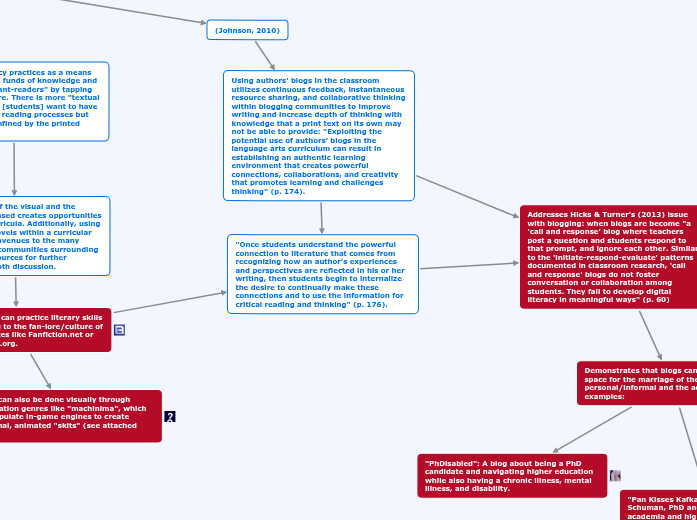What makes an authentic, tech-rich English classroom
(Whitney, 2011)
Providing an honest, meta-perspective on literacy practices in classrooms: "And it seems to me that the reason we gather people into classes called “reading” or “language arts” rather than just turning everyone loose to lie on their stomachs or walk into poles or relax in their cars is precisely so that we can step away from the practices themselves for a moment and become self-conscious about those practices. We gain control over and be- come better users of that which we can at least momentarily hold up to the light; school offers a safe place to do this with our literacies" (p. 57).
We need to situate students in the sociohistorical contexts of activities:
"I’ve come instead to embrace a vision of schools as both learning places and being places—contexts for experience (being) in and of themselves even as they look outward to future experience (learning). [..] The classroom is simply a place, one place among the many in which we learn and be. Yet it is a special place in that our main task together in the classroom is to attend to learning—not just to learn but to attend to learning, to understand how we learn, and get good at it, and talk about it, perhaps differently than we might other places" (p. 58).
(Jolley, 2008)
Game-based literacy practices as a means of utilizing student funds of knowledge and motivating "reluctant-readers" by tapping into a familiar genre. There is more "textual ownership": "They [students] want to have choice within their reading processes but sometimes feel confined by the printed world" (p. 83).
The combination of the visual and the textual in game-based creates opportunities for multimodal curricula. Additionally, using popular graphic novels within a curricular context opens up avenues to the many online produsage communities surrounding these texts as resources for further exploration/in-depth discussion.
Younger students can practice literary skills while contributing to the fan-lore/culture of games through sites like Fanfiction.net or ArchiveOfOurOwn.org.
This can also be done visually through animation genres like "machinima", which manipulate in-game engines to create original, animated "skits" (see attached link).
(Johnson, 2010)
Using authors' blogs in the classroom utilizes continuous feedback, instantaneous resource sharing, and collaborative thinking within blogging communities to improve writing and increase depth of thinking with knowledge that a print text on its own may not be able to provide: "Exploiting the potential use of authors’ blogs in the language arts curriculum can result in establishing an authentic learning environment that creates powerful connections, collaborations, and creativity that promotes learning and challenges thinking" (p. 174).
"Once students understand the powerful connection to literature that comes from recognizing how an author’s experiences and perspectives are reflected in his or her writing, then students begin to internalize the desire to continually make these connections and to use the information for critical reading and thinking" (p. 176).
Addresses Hicks & Turner's (2013) issue with blogging: when blogs are become "a 'call and response' blog where teachers post a question and students respond to that prompt, and ignore each other. Similar to the 'initiate-respond-evaluate' patterns documented in classroom research, 'call and response' blogs do not foster conversation or collaboration among students. They fail to develop digital literacy in meaningful ways" (p. 60)
Demonstrates that blogs can also create a space for the marriage of the personal/informal and the academic. Some examples:
"PhDisabled": A blog about being a PhD candidate and navigating higher education while also having a chronic illness, mental illness, and disability.
"Pan Kisses Kafka": Blog of Rebecca Schuman, PhD and outspoken critic of academia and higher education structure in the US, where she talks casually about these topics and literature, as well as motherhood, womanhood, and miscellaneous topics.
"Slate Star Codex": Published writer Scott Alexander's blog where he writes about economics, biology, and politics with a humorous twist.
Re: Hicks & Turner (2013), validating "digitalk" as a form of linguistic diversity.
